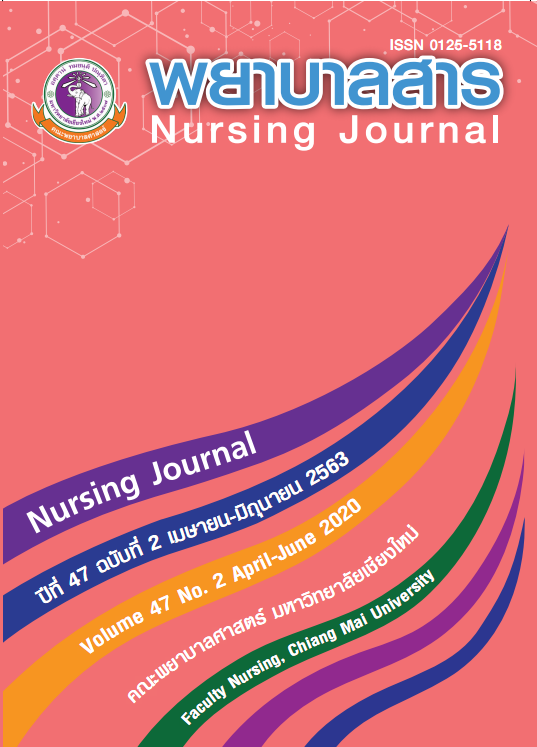Factors Predicting Organizational Citizenship Behaviors Among Generation Y Nurses, Government University Hospitals
Keywords:
Factor Predicting, Organizational Citizenship Behaviours, Nurses, Generation Y, Government University HospitalsAbstract
Organizational citizenship behaviors are important to the effectiveness and the success of nursing organizations. The purposes of this research study were to identify perceived organizational support, trust in head nurses, organizational citizenship behaviors and the predicting factors of organizational citizenship behaviors among Generation Y nurses at government university hospitals. The sample included 306 Generation Y nurses at Northern regional government university hospitals. Research instruments included: 1) Demographic Data Questionnaires; 2) Perceived Organizational Support Questionnaires developed by Sanghon, Thungjaroenkul & Nantsupawat (2017); 3) Trust in Head Nurses Questionnaires developed by Sirawongtham (2002); and 4) Organizational Citizenship Behaviors Questionnaires developed by Podsakoff et al. (1990), translated into Thai by researchers. Reliabilities of part 2 to 4 Questionnaires were computed, the instruments’ Cronbach’s alpha coefficients were .87, .96 and .85 respectively. Data were analysed using stepwise multiple regression.
The results of the study revealed that: perceived organizational support was at a moderate level, trust in head nurses and organizational citizenship behaviors were at a high level. Factors that significantly predicted organizational citizenship behaviors were openness dimension of trust in head nurses and perceived organizational support at level .05. These predictors were accounted for 14.20 % of variance. (R2 = .142) The results could provide basic information for nurse managers to be aware of the importance of organizational support, trust in head nurses and paves the way for promote organizational citizenship behaviors among Generation Y nurses at government university hospitals.
References
Clark, K. R. (2017). Managing Multiple Generations in the Workplace. Radiologic technology, 88 (4), 379-396.
Eisenberger, R., Huntington, R., Hutchison, S., & Sowa, D. (1986). Perceived organizational support. Journal of Applied Psychology, 71, 500–507.
Fatma, A., & Elewa, H. A. (2016). The Relationship between Org anizational Support, Work Engagement and Organizational Citizenship Behavior as Perceived by Staff Nurses at Different Hospitals. Journal of Nursing and Health Science, 5 (4), 112-123.
Halfer D., & Graf, E. (2006). Graduate nurse perceptions of the work experience. Nurs Econ, 24(3), 150-155.
Iamsa-ard, P. (2009). Relationships between Trust in Head Nurses, Organizational Citizenships Behavior and Organizational Commitment of Nursing Employee, Gov ernment University Hospitals (Master’s thesis, Chulalongkorn University). (In Thai)
Intaratate, N. (2013). Organizational Citizenship Behavior of Professional Nurses in o ne TertiaryHospital (Master’s thesis Mahidol University). (In Thai)
Jeenkool, P. (2004). Relationships between Personal Factors, Achievement Motivation , Organizational Support, and Career Success of Professional Nurs es, Government University Hospitals (Master’s thesis, Chulalongkorn University). (In Thai)
Khunthar, A. (2014). The impacts and Solutions to Nursing Workforce Shortage in Thailand.Journal of Nursing Science, 32(1), 81-90. (In Thai)
Laipanittawon, P. (2007). Relationships among perceived organizational justice, locus of control and organizational citizenships behavior of professional nurses in Community Hospitals in Lampang Province (Master’s thesis, Chiangmai University). (In Thai)
Lavoie-Tremblay, M., Leclerc, E., Marchionni, C., & Drevniok, U. (2010). The needs and expectations of generation Y nurses in the workplace. Journal for Nurses in Professional Development, 26(1), 2-8.
Moorman, R. H., & Blakely, G. L. (1995). Individualism-collectivism as an individual difference predictor of organizational citizenship behavior. Journal of Organizational Behavior, 16 (2), 127–142.
Nelsey, L., & Brownie, S. (2012). Effective leadership, teamwork and mentoring-essential elements in promoting generational cohesion in the nursing work force and retaining nurses, Collegian (Royal College of Nursing, Australia), 19 (4), 197-202.
Nesa, M., Kunawikitkul, W., & Wichaikhum, O. (2018). Participation in Decision Making andOrganizational Citizenship Behavior among Nurses in Medical Col lege Hospitals, Dhaka, The People’s Republic of Bangladesh. Nursing Journal, 45 (4), 192-202.
Organ, D., & Podsakoff, P. M. (2006). Organizational citizenship behavior: Its nature, antecedents, and consequences. United States of America: Sage Publication, Inc.
Podsakoff, P. M., MacKenzie, S. B., Moorman, R. H., & Fetter, R. (1990). Transformational leader behaviors and their effects on followers’ trust in leader, satisfaction, and organizational citizenship behaviors. The leadership quarterly, 1(2), 107-142.
Podsakoff, P. M., MacKenzie, S. B., Paine, J. B., & Bachrach, D. G. (2000). Organizational citizenship behaviors: A critical review of the theoretical and empirical literature and suggestions for future research. Journal of Management, 26 (3), 513-563.
Rhoades, L., & Eisenberger, R. (2002). Perceived organizational support: a review of the literature.Journal of Applied Psychology, 87 (4), 698-714.
Robbins, S. P. (2001). Organizational Behavior. New Jersey: Prentice-Hall, Inc.
Shacklock, K., & Brunetto, Y. (2012). The intention to continue nursing: work variables affecting three nurse generations in Australia. Journal of Advanced Nursing, 68 (1), 36-46.
Sherman, R. O., Saifman, H., Schwartz, R. C., & Schwartz, C. L. (2015). Factors that lead Generation Y nurses to consider or reject nurse leader roles. Nursing Plus Open, 1, 5-10.
Sanghon, K., Thungjaroenkul, P., & Nantsuupawat, A. (2017). Perceived organizational support and proactive work behavior among registered nurses. Nursing Journal, 44 (4), 134-144. (In Thai)
Sirawongtham, S. (2002). Relationships between Trust in Head Nurses, Organizational Commitment, Organizational Support and Organizational Citizenships Behavior of Staff Nurses, General Hospitals (Master’s thesis, Chulalongkorn University). (In Thai)
Srisatidnarakul, B. (2007). The methodology in Nursing Research. Bangkok: UandI intermedia company. (In Thai)
Techanant, P. (2013). A study of relationship between workplace motivation and Organizational Citizenships Behavior of University support staff: A case study of medicine in Bangkok (Master’s thesis, Silpakorn University). (In Thai)
Yongprawat, T., Noimunwai, P., & Prapaipanit, W. (2016). The Relationships between Generations,Magnetic Work Environment, and Working Happiness as perceived by Professional Nurses. Journal of The Royal Thai Army Nurses, 17 (1), 148-155. (In Thai)
Downloads
Published
How to Cite
Issue
Section
License
บทความที่ได้รับการตีพิมพ์เป็นลิขสิทธิ์ของวารสารพยาบาลสาร
ข้อความที่ปรากฏในบทความแต่ละเรื่องในวารสารวิชาการเล่มนี้เป็นความคิดเห็นส่วนตัวของผู้เขียนแต่ละท่านไม่เกี่ยวข้องกับมหาวิทยาลัยเชียงใหม่ และคณาจารย์ท่านอื่นๆในมหาวิทยาลัยฯ แต่อย่างใด ความรับผิดชอบองค์ประกอบทั้งหมดของบทความแต่ละเรื่องเป็นของผู้เขียนแต่ละท่าน หากมีความผิดพลาดใด ๆ ผู้เขียนแต่ละท่านจะรับผิดชอบบทความของตนเองแต่ผู้เดียว






